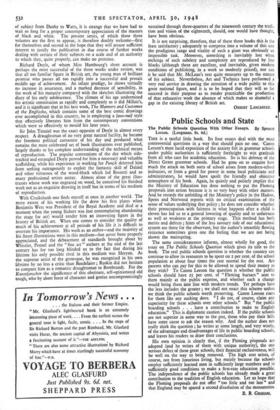Public Schools and State
The Public Schools Question With Other Essays. By Spencer Leeson. (Longmans. 8s. 6d.) Tins is a tactful little book. Its four essays deal with the most controversial questions in a way that should pain no one ' Canon Leeson's most lucid exposition of the anxiety felt in grammar schools under public authorities is sufficiently forthright to win gratitude from all who care for academic education. So is his defence of the Direct Grant grammar schools. Had he gone on to enquire how much the attack on both sorts of school arises from modem-school jealousies, or from a greed for power in some local politicians and administrators, he would have spoilt the friendly and objective atmosphere of his book. Again, he quietly and politely implies that the Ministry of Education has done nothing to put the Fleming proposals into action because it is so very busy with other matters. And he records the unfolding of the Ministry's policy in the Hadow, Spens and Norwood reports with no critical examination of the sense of values underlying that policy ; he does not consider whether their preoccupation-with fairness in what happens after a child is eleven has led us to a general lowering of quality and to unfairness as well as weakness at the primary stage. This method has both merits and defects ; hints of the less savoury side of our educational system are there for the observant, but the author's smoothly flowing reticence sometimes gives one the feeling that we are not being shown the mainspring.
The same considerateness informs, almost wholly for good, the essay on The Public Schools Question which gives its title to the book. The real public schools question is whether the country can continue to allow its resources to be spent on 2 per cent. of the school population at about four times the rate normal for the rest. Are parents who can pay for this to be allowed to spend their money as they wish? To Canon Leeson the question is whether the public schools should have 25 per cent. of "Fleming bursars" sent to them mainly at the public expense and whether such a change would bring them into line with modern trends. Yet perhaps here the less includes the greater ; we shall not enact this scheme unless we think the public schools worth preserving. Canon Leeson roars for them like any sucking dove. "I do not, of course, claim any superiority for these schools over other schools." But "the public boarding schools . . . have a contribution to make to English education." This is diplomatic caution indeed. If the public schools are not superior in some way to the rest, those who pay their bills have some cause to ask the reason why. And the author does not really shirk the question ; he writes at some length, and very wisely, of the advantages and disadvantages of life in public boarding schools, and leaves his readers to draw their conclusions.
His own opinion is clearly that, if the Fleming proposals are adopted (and he writes of them with unique authority), the one serious defect of these great schools, their financial exclusiveness, will be well on the way to being removed. The high cost arises, of course, not from luxurious living, but mainly because the schools employ sufficiently learned men in sufficiently large numbers and in sufficiently good conditions to make a first-rate education possible. The independence of the public schools has already made a great contribution to the tradition of English education. Let us hope that the Fleming proposals. do not offer "too little and too late" and that England may be spared a second dissolution of the monasteries.
R. B. GRAHAM.






























 Previous page
Previous page